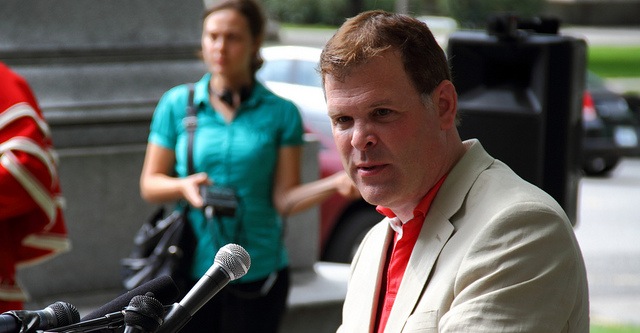Like this article? Chip in to keep stories likes these coming.
Minister of Foreign Affairs John Baird is leaving politics.
They say he wants to make some money while he is still young. It might surprise many, but he is still only in his 40s.
Baird started young in politics.
He was only in his 20s when he became part of Ontario Conservative Premier Mike Harris’ Common Sense Revolution.
Together with Tony Clement and Jim Flaherty, Baird was part of the Harris gang that brought much needed experience to Stephen Harper’s new Conservative government in 2006.
Baird was a kind of Mr. Fix-It for Harper.
As President of the Treasury Board he initiated the Harper government’s slash and burn exercise.
A memorable moment came when he announced the defunding of a number of civil society organizations, incuding women’s and Aboriginal groups, and killed the Court Challenges Program.
The last named program made it possible for disadvantaged groups in society to go to court to assert their rights as defined and guaranteed by the Constitution’s Charter of Rights and Freedoms.
The Harper government thinks only those with cash — i.e., for the most part, big businesses — should be able to sue for their rights.
Baird took over the Environment Ministry when the then-incumbent Rona Ambrose seemed wobbly and insufficiently committed to the government’s passive-aggressive and (to use Green Party Leader Elizabeth May’s phrase) “tough-on-nature” stance.
John Baird acted as House Leader in the minority Parliament and, despite his bulldog reputation, displayed his amiable and charming side more often then his ‘Angry John’ persona.
And he has thrived as Foreign Minister, especially when he could engage in the kind of almost embarrassing self-righteous strutting the Harper government favours.
Behind the scenes it is said Baird has from time to time shown a genuine commitment to human rights that his boss might not entirely share.
Harper is not always logical in his political choices, but in selecting a replacement for Baird one would think he might seek someone who is bilingual and has the requisite political experience. As well, the Prime Minister will want to make sure his Ontario cabinet contingency stays at least as strong post-Baird as it has been with Baird.
Lots of names are being bandied about, including Lisa Raitt, who is currently Transport Minister and is from Ontario. She does not have much French, if any, however.
Harper could also choose current Immigration Minister Chris Alexander, who was once Canadian Ambassador to Afghanistan.
Alexander represents a vulnerable, swing riding, east of Toronto, and speaks perfect French. One suspects, however, that Harper does not entirely trust him, despite Alexander’s efforts to slavishly follow the government’s tough line on everything, including refugees.
McGill University asked eminent graduates, including Alexander, to name professors whom they admired. Alexander named long-time New Democrat and political philosopher Charles Taylor, who is very close to NDP Leader Tom Mulcair. Might have been a bad choice for anyone with ambitions in this government.
Worse, former Progressive Conservative Foreign Minister and Leader Joe Clark (no admirer of Stephen Harper) has had nice words to say about Alexander. Not the kind of friend you want to have if you want to be a friend of Harper.
Employment Über Minister Jason Kenney’s name inevitably comes up, but like the Prime Minister he represents a seat in Alberta — in Calgary, in fact.
The Prime Minister could name amiable, bilingual and still young Industry Minister James Moore, who represents a British Columbia riding, to the Foreign Affairs job.
Having done that Harper could do a mini-shuffle that would give Industry — a key portfolio for central Canada — to an Ontario Minister such as Raitt.
And he then could reinfore Ontario’s cabinet representation by naming another Ontario up-and-comer (shudder, that could be current Democratic Reform Minister Pierre Poillievre, who, like Baird, represents an Ottawa riding) to Raitt’s current position, the big portfolio of Transport and Communities.
That would seem a sensible and smart way to proceed.
But good sense does not always govern such decisions when it is Stephen Harper making the choices — see under Fantino, Julian.
Photo: flickr/Andrew Rusk



